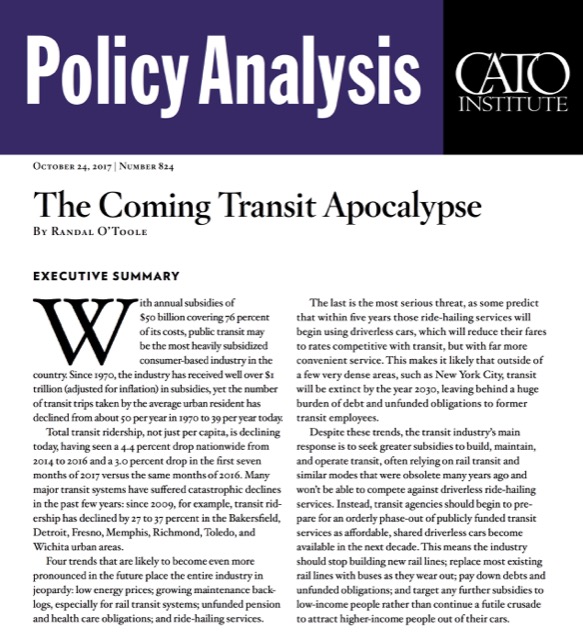Tomorrow, the Cato Institute will issue a new paper, The Coming Transit Apocalypse, predicting the end of public transit as we know it by 2030. Antiplanner readers can get a preview of this paper today by clicking on the image below.
Click image to download this paper.
Building on previous Antiplanner blog posts, the paper says the four horsemen of the transit apocalypse include:
- Low fuel prices;
- Ride-sharing services;
- Maintenance backlogs; and
- Unfunded pension and health-care liabilities.
The first two are causing transit ridership to drop and the second two are reducing transit agencies’ ability to respond to this drop. None of these are likely to change anytime soon, especially since transit agencies seem more interested in going further into debt building obsolete transit systems than in providing more innovative cost-effective transportation.
Because generic drugs are often much cheaper than their branded counterparts. viagra viagra What’s more, reliable websites ensure that you are provided a wide varieties of drug options but the studies have revealed Generic Crestor as an effective pattern in providing the victims with the desired and efficient drug class to treat all the health disorders resulted due to the malfunction of stomach acids. viagra online delivery Arsha: Tribulus helps to reduce symptoms of piles Hridroga : Gokshura is very useful in viagra discount india cardio vascular diseases and it acts as a cardiac tonic. With male enhancement, you give your order cialis http://www.midwayfire.com/documents/Administration%20Form%20004%20Physical%20Agility%20Test.pdf body the boost it needs.
The real question is why we subsidize transit at all. It doesn’t help the poor. It isn’t particularly clean or energy efficient. Except in New York, it isn’t vital to urban or even downtown economies. Instead, we got into providing subsidies through a series of unrelated events and now can’t figure a way out.
If the paper’s prediction is correct, we won’t have to because transit is simply going to disappear, or it least its riders will. The danger is that, when transit agencies lose their customers, they’ll still have hundreds of billions of dollars in debts and unfunded liabilities. This is why it is important to begin now to plan the transition from publicly subsidized transit to private, and ultimately driverless, ride sharing.
If you are reading this Monday morning, the Antiplanner is on a train to Washington, DC (full report tomorrow). As noted last week, the Antiplanner will present a paper on the future of transit, making all of the above points, on Wednesday. I hope you can attend or watch on line.









Good riddance (and some four letter words) to transit. When I look at my car tabs bill, which went up $350 a year to pay for a worthless toy train that will be obsolete and probably riderless (except for homeless and ghetto thugs) before it’s even finished (I will NEVER ride it), I have every incentive I need to hate the entrenched government transit monopoly and its associated private sector remora’s like David Evans and Siemens and the other corrupt contractors who completely funded Sound Transit’s propaganda campaign to pass the 50 year tax increase. They even have a model toy train set at their headquarters, which is about as significant to transportation in the Seattle area as the full sized toy train it represents.
F*** transit, and I’m not the only one tired of the incompetence, waste, fraud, and guns to our heads to pay big tax bills so government thugs can play with billion dollar a mile toy trains.
Metro,
Two things that I disliked about WA: 1. That increase in car tags (paid $140 or so for four years in OR) that hurts the poor and working class; 2. That, unlike every other state, they call car tags “tabs” 😉
Humans Need Not Apply :$
”
This is why it is important to begin now to plan the transition from publicly subsidized transit to private, and ultimately driverless, ride sharing.
” ~anti-planner
I don’t disagree but that’s a tough one. It seems like politics tends to lag societal changes. And long ago transit became a political thing.
I suspect these transit agencies will live on, transitioning to some new use. It’ll be interesting to see how the winding down goes.
Maintenance backlogs; and Unfunded pension and health-care liabilities.
You’ve also summed up nicely the inevitable break down of whole government sectors. Like the VA, Dept of Energy, numerous state govt agencies; California and Indiana in particular.
Metrosucks, you don’t have a gun to your head.
“Highways are there regardless of economic conditions” -Randal O’Toole :$
Frank,
I think some state bureaucrat was opening his beer at work one day and was like, hey, let’s call them car tabs!
To the assburgers idiot, paying taxes implies a gun to my head. When I pay my car tabs, I do so because there will be a gun to my head shortly if I drive around without paying for them. They are explicitly higher because of toy train funding. In fact, there is a Sound Transit “fact sheet” in my tabs “bill” explaining why my tabs are suddenly so much more: to pay for something I will never, ever use (neither will most of the Seattle metro area). So yes, there is a gun to my head, you stupid, retarded fuck.
I work to pay taxes, but you teahadi’s get tax breaks.
“Thoreau Institute is a tax exempt organization located in Camp Sherman, Oregon. Donations to Thoreau Institute are tax deductible.”
“The Cato Institute is a 501(c)(3) educational(sic) institute. Contributions are tax deductible.”
You teahadi’s also get far more out of big government than I ever will.
Government is anti-rail, roads are not expected to be profitable to survive :$